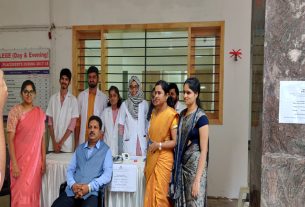Out of seven established NIPERs, only Mohali has an established campus. The proposals for five more institutions have been pending since 2012.
The shortage of staff in the National Institute of Pharmaceutical Education and Research (NIPER) institutes has been creating a hindrance to the growth of the institutions all across India. The employability rate has also shown a decline in the past few years.
The demand for jobs has decreased in pharmaceutical companies. There have been lesser job opportunities for students in positions other than sales representatives or data analysts, said Dr. Tarun Virmani, professor and dean at the School of Pharmaceutical Sciences, Haryana. Job opportunities for other roles like research and development, manufacturing, and regulatory affairs were less during C`ovid times especially, he added.
Virmani explained the reasons for the lack of academic staff in most pharmaceutical colleges. He said that initially, the jobs are not well-paying; hence people tend to switch a lot. Often in India, people tend to leave jobs without serving the notice period. This becomes a problem for the institution as it becomes difficult for them to find a replacement immediately. Hence many times, the professors end up taking more subjects to compensate, he added.
Academic Staff
| Man-Power | Sanctioned | In-position | Vacancy |
| Academic | 62 | 26 | 36 |
| Non Academic | 223 | 127 | 96 |
Reports show that NIPERs have struggled with the shortage of staff for a long time now. The then standing committees’ report had mentioned that most employees were hired on contractual basis and not permanently. The lack of regular staff—academic and non-academic, caused a hindrance in attaining excellence and quality in the field of pharmaceutical education and research.
There is a lack of staff due to insufficient pay scales in the academic profession due to which either people end up switching or not pursuing teaching, said a researcher at the Indian Council of Medical Research, Akshay Shamnewadi.
Due to a lack of quality education and a shortage of qualified staff, the Pharmacy Council of India (PCI) has imposed restrictions on setting up new pharmacy colleges for the next five years. The report also mentioned that a concern was raised during a high-level meeting about the mushrooming of pharmacy colleges lacking quality education, as a result of which most of their graduates remain unemployed.
There should be a cross-movement between academics, industry, and government for efficient working of the entire system said, Dr. Anish Desai, MD, founder, and CEO of IntelliMed Healthcare. Currently, what the system lacks is that many organizations do not have honorary faculty from the industry. There is a competition between academics and industry when it should be cohesive. This becomes a problem because industry experts are equally capable of teaching and skill-building capabilities. At times they can help in giving a better perspective to students about career options for instance, he added.
Current Scenario
The latest report by Standing Committee on Chemical and Fertilizers stated that despite NIPERs being declared as Institutes of National Importance there are huge disparities among NIPERs in terms of infrastructure, courses offered, campus area, and academic and research outputs. It recommended that certain standards for such parameters may be established to ensure that every NIPER meets the standards of an Institution of National Importance.
The report further added that the Committee observed that out of the seven established NIPERs, only NIPER Mohali has a finished campus. The Committee noted that proposals to create five more NIPERs (at Madurai, Jhalawar, Nagpur, New Raipur, and Bengaluru) have been pending since 2012.
The Committee also noticed that the bill does not provide for the transfer of Directors and faculty members among NIPERs. They said that the transfers among NIPERs may encourage mutual sharing and learning between NIPERs. It recommended that the Bill should empower the Department of Pharmaceuticals to enable the inter-NIPER transfer of members.
NIPERs lack competency and regulation, the institutes require being registered under the Pharmacy Council of India (PCI) but are monitored by the All India Council for Technical Institution (AICTE), said Vijaybhaskar Annapareddy, state president, Indian Pharmacy Graduates Association (IPGA). He added that the World Health Organization (WHO) advent report calls this situation one woman with two husbands.
Employability Status
A student and placement coordinator at NIPER Mohali, Vaidik Vora, said that the placements had taken a hit since 2019 due to the pandemic. He said that usually two kinds of companies come for placements at NIPERs—core pharma companies and consulting companies—before the pandemic the placement scenario was fine but the batch of 2019-21 suffered a lot. Very few companies came for placements and also got offered very low packages, he added.
Employability Status
| Batch | Total Students | Not Placed | Placed | Going for higher education |
| 2016-18 | 69 | 6 | 54 | 9 |
| 2019-20 | 72 | 1 | 46 | 25 |
| 2020-21 | 96 | 13 | 65 | 18 |
Another student at NIPER Mohali, Aniket Dhane pursuing M.S. in Pharmacoinformatics, said that at least in his department he had not seen a lack in staff both academic and non-academic. He also added that employability was affected by covid but it has improved and opportunities have increased now. There are plenty of jobs available in the market for students—lack of clarity in choosing possible opportunities is a reason why many times students tend to not take up certain jobs or go for higher education, Desai said. With his experience of interviewing students, he said that they tend to take up clerical jobs at times because they are slightly high paying initially but tend to not think of their long-term goals. There seems to be a lack of guidance and career planning, he added. Due to these reasons, he often faces problems in choosing the right candidates for various roles.




